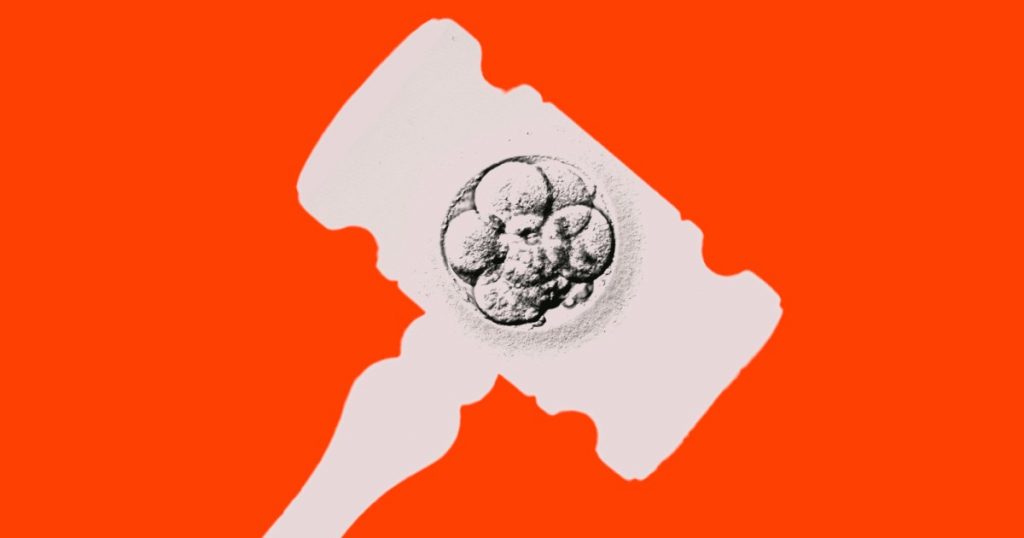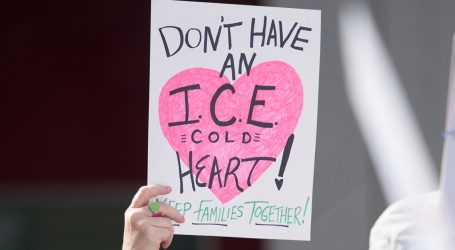Repro-Rights Advocates Focused on Abortion and Not Pregnancy. That Was a Mistake.
Mother Jones; Getty
Fight disinformation: Sign up for the free Mother Jones Daily newsletter and follow the news that matters.As the Supreme Court prepares for arguments in a wide-ranging case over the FDA’s regulation of mifepristone, it’s hard to fathom what might happen if the abortion pill, which now accounts for 63 percent of abortions in the US, becomes largely unavailable. But then again, for a very long time, it was hard for the vast majority of Americans to believe that Roe v. Wade might be overturned. Or for all but the most apocalyptic-minded to imagine that ultra-right justices in Alabama, inspired by Christian Nationalism, might someday declare frozen embryos created in a fertility clinic to be children, literal persons, under the law.
Civil rights lawyer and reproductive justice pioneer Lynn Paltrow is one of the rare exceptions. “Maybe there’s something about being Jewish, and brought up on the knowledge of the Holocaust, that’s sensitized me to the possibility of the worst-case scenario being real,” she says from her home office in New York, taking a break from the book she’s been writing. With the Alabama Supreme Court’s ruling on IVF, Paltrow jokes that she finally has its title: I Told You So.
Paltrow began working on abortion cases as an intern with the ACLU Reproductive Freedom Project in the early 1980s; later she helped found what is now the Center for Reproductive Rights. But even as she was filing lawsuits and amicus briefs to defend Roe, she came to believe that her side’s single-minded focus on abortion was myopic and, she feared, potentially disastrous. In 2001, she founded National Advocates for Pregnant Women, taking up the types of issues that mainstream pro-choice groups were mostly ignoring—the policing of pregnancy, for instance, and the emerging threat posed by claims of fetal personhood. Though Paltrow stepped down from NAPW, now Pregnancy Justice, in 2023, she’s paying as close attention as ever to the many ongoing efforts to “deny women, and anyone with the capacity to be pregnant, of their personhood.” Whether the issue is mifepristone or fetal rights, the ultimate goal, she warns, is far more ambitious than banning abortion. It’s to “ensure male supremacy and a society in which men have certain roles and women have others.”
What was the first case you came across that made you start to understand the implications of the idea that a fetus is a separate legal person from its mother—and that pro-choicers should be focusing on pregnancy, not just abortion?
There were two cases. The first was the criminal prosecution of Pamela Rae Stewart in 1986. She was a poor white woman near San Diego whose baby was severely compromised and died five weeks after birth. One factor in the charges was that she had allegedly used criminalized drugs during pregnancy—marijuana and amphetamines. But the prosecutors ultimately admitted that was not the real reason for the case. Her real crime was not obeying her doctor’s orders. They said she hadn’t gotten early enough prenatal care; she didn’t take her prescribed medication; she didn’t get to the hospital quickly enough on the day of delivery—she started hemorrhaging and lost five cups of blood. My favorite—this is a quote from the prosecutors’ brief—was that she had “subjected herself to the rigors of sexual intercourse” on the day she gave birth.
It was the first time that most people had ever heard of a woman’s actions during pregnancy being policed and criminalized this way. It also showed how prosecutors could take existing laws that had nothing to do with drug use or pregnancy and twist them for their purposes. The California legislature had amended its murder laws in 1970 to allow homicide charges against someone who killed a fetus in the commission of a crime, but the statute was very clear that it could not be used in the context of abortion or against the mother. So instead of charging Pamela Rae with murder or manslaughter, prosecutors used a misdemeanor criminal child support law that required parents to support their children, including “children conceived but not yet born.”
We got the trial court judge to dismiss it. It was an absolute victory for Pamela Rae Stewart. But very quickly there were scores of similar cases around the country that disproportionately targeted Black mothers, using laws written for another purpose, like charging women with child abuse or distributing drugs to a minor.
What was the second case?
It was just a year later, in 1987. Angela Carder was a young woman, confined to a Washington, DC, hospital with cancer—a tumor in her lungs the size of a football. She was also 26 weeks pregnant. The fetus was not viable, it was never going to live; the tumor had deprived it of oxygen for too long to survive. Her family wanted the hospital to keep Angela comfortable and alive for as long as possible. But the hospital called an emergency hearing to determine the rights of the fetus and obtained a court order for cesarean surgery. The baby lived for two hours; Angela for another two days.
Eventually, at the appellate level, we were able to get a decision that held, in effect, that women who become pregnant don’t lose their civil rights. But in a dissent, one appellate judge claimed that “the expectant mother,” because she has “undertaken to bear another human being” to the point of viability, places herself “in a special class of persons.” And over the years there have been numerous cases—including forced c-sections, forced bedrest—in which other courts essentially say something very similar: We know we’re violating a woman’s rights, but this is different, she’s pregnant.
So, thinking about the slippery slope, my first two cases started at the bottom of it. No exaggeration, no hyperbole. The Pamela Rae Stewart case made me understand that claims of separate, legal personhood for an embryo or fetus could become a mechanism for policing half the people in the United States, the half that can get pregnant. And then the Angela Carder case made clear that it wasn’t simply that you could lose your physical liberty and go to jail. You could lose your right to life.
I associate these kinds of rulings with, say, Texas or Alabama. But this isn’t just happening in conservative states.
No! In a report last fall, Pregnancy Justice found nearly 1,400 cases of pregnancy-related criminalization across the US just in the past 16 years, including in New York. Even in California, after Pamela Rae Stewart’s case was thrown out, there were at least four other cases in which individual prosecutors brought charges to try to make a name for themselves. As recently as 2019, a woman was charged with murder after having a stillbirth that prosecutors claimed was caused by methamphetamine use. It wasn’t until 2022 that the California legislature finally passed a law that said you can’t do this.
Let’s be clear: Methamphetamine not only doesn’t cause stillbirths, it doesn’t even have a theoretical [physiological] pathway for causing stillbirths. Think about all people on Ritalin and other medications with the same chemical makeup as meth that do not cause stillbirths. If methamphetamine—or any of the criminalized drugs—were good at ending pregnancy, don’t you think we’d be shipping them to Texas and Alabama? It’s probably a hell of a lot easier to get methamphetamine in those places than it is to get mifepristone.
Beyond banning abortion, what do you think is the goal of people who argue for fetal personhood?
They claim it’s to “protect unborn life from its earliest stages of development.” But what I’m seeing—and this is the only thing that I think allows one to make sense out of all of the laws and policies that purport to regulate abortion and birth control and IVF—is that they are all mechanisms for ensuring a subordinate status for women and anybody who can become pregnant. That’s why I’ve started calling it the anti-abortion, pro-misogynist movement.
I hear people say all the time that the personhood movement wants to give the fetus more rights than the mother. No, it’s more rights than any living person. No living person has the right to require anybody else to undergo any health intervention on their behalf. No living person has a right to require another living person to give them blood or an organ. Even if it’s their twin sister, their mother, their father. But according to the personhood people, fertilized eggs, embryos, and fetuses have more rights than any living person because their existence could require women to literally die for them. Fetuses have rights even when they’re completely nonviable, as happened in the Angela Carder case.
How did the anti-abortion movement grab hold of the personhood idea? And how did criminalizing pregnancy become a key part of it?
One of the foundations of Roe v. Wade was the conclusion that fetuses are not constitutional persons at any stage of development. Right after Roe came down, people on the [anti-abortion side] began strategizing: What can we do to challenge that holding?
There were proposals to amend the US Constitution to have the unborn declared full persons under the law, which ultimately failed. There were a few state ballot measures that also mostly failed. Instead, the strategy that proved to be most effective was injecting into every possible law the idea that constitutional personhood begins at conception and that fetuses should be viewed as separate and independent from their mothers. For example, laws that made the killing of a fetus a crime. Or wrongful death laws that let a family sue if a pregnant person and her unborn child are killed in an accident.
I have never been able to find a deliberate strategy by [the anti-abortion] movement to connect personhood with the criminalization of pregnancy—at least, not at the beginning. Instead, it seemed like individual prosecutors picked up on the legal personhood arguments and found them irresistible. There was a huge drug war going on and they could not show any accomplishments in stemming the tide of drugs. But if they targeted pregnant women, lo and behold, they got national press. And they created the illusion that they were doing something about drugs.
Then anti-abortion groups saw what they were doing and understood that prosecuting women for allegedly harming their fetuses was consistent with their personhood playbook. And they could use these arrests and prosecutions to their advantage.
Even though these prosecutions were popping up all over the country, the higher courts were skeptical. When did that change?
For many years, at the appellate level, we were able to get courts to recognize that interpreting various state laws—like laws against the delivery of drugs to a minor—to prosecute women was a violation of legislative intent. And they would throw the cases out. Then came the Cornelia Whitner case in South Carolina in 1997.
She was a Black mother who gave birth to a healthy baby who tested positive for cocaine. She was arrested under the state’s child endangerment and neglect laws. Her court-appointed lawyer had just left the prosecutor’s office—as far as she was concerned, this was a legitimate prosecution. She advised Cornelia to plead guilty in the hope of getting some kind of treatment, which is an extremely naive position because there’s basically no drug treatment available for pregnant women or mothers. Instead, Cornelia got eight years in jail. There was absolutely no legislative history to support the interpretation of the child abuse law in the context of pregnancy. But, to me shockingly, the state supreme court ruled in favor of the prosecution. I should never have been shocked. We then had a lot of cases arguing that other states should treat Whitner as an outlier. And we were successful—for the next 15 years, courts in other places continued to throw out these cases.
Until prosecutors in Alabama started charging women with chemically endangering their fetuses, under a felony law that was passed to protect actual children from meth labs.
When the Alabama cases started happening, we knew we were going up against an incredibly conservative state supreme court. We had no illusions about the outcome, and we were right. In 2013, the Alabama Supreme Court ruled that the state’s meth lab law could be used to prosecute people for substance use in pregnancy. To get there, they dismissed the many other rulings around the country that they disagreed with and singled out the Whitner case as supporting the idea that women could, and should, be prosecuted.
What was different was the broader goal. The South Carolina court was focused on the case in front of them—the crack baby hysteria. They didn’t say “Roe v. Wade was decided wrongly.” The Alabama ruling was very much part of a broader agenda to explicitly attack and eventually overturn Roe. A whole string of Alabama cases built on each other, trying to make arguments for personhood by mischaracterizing many areas of the law, from inheritance laws to torts like wrongful death. The IVF decision is part of that series of cases.
Do you think people on the abortion rights side have been slow to understand the threat posed by personhood?
I was disappointed by the lack of any kind of national feminist outcry at the Whitner decision. It had the effect of seeming to endorse an idea of legal personhood for viable fetuses. I’ve seen this happen in many other cases—there’s a legal argument or even a ruling that seems so narrow or outlandish that the pro-choice side doesn’t bother to push back. When we fail to respond—to offer an ideology that values the personhood of women and people who get pregnant—we go one more step backward.
What do you think accounts for this pro-choice blind spot?
A few things. There are a lot of silos. For much of the past 50 years, the mainstream pro-choice groups were focused almost exclusively on the right to abortion. Although as individuals, they understood that right as representing much more than a single medical procedure, there was no campaign to explain abortion as necessary to the full equality and citizenship—the personhood—of women in this country. They were defending abortion as opposed to the people who sometimes need abortions but always need to be treated as full constitutional persons under the law, whatever the outcome of their pregnancies.
Even on the pro-choice side, a lot of people thought of pregnancy and abortion as two different things. Years ago, when I was at National Advocates for Pregnant Women, I was invited to talk at a prestigious public health school. One of the people who invited me was a bioethicist I’d worked with years before. In anticipation of my talk, she called and asked, “What made you change from working on abortion to working on pregnant women?” I was like, “You know you don’t need an abortion unless you become pregnant…?”
And then many people working on abortion issues felt that connecting the protection of the right to abortion to drug policy issues was incredibly dangerous for their cause. I understand that. But, the fact is, they were being linked by the right. Refusing to respond to that connection ended up keeping our side extremely vulnerable.
Did people on the pro-choice side also tend to believe that some of the decisions happening in, say, Alabama were so far out on the fringe that they wouldn’t have any real influence?
People have a hard time believing that the worst and the craziest can happen. The ongoing willingness to say, “Oh, that’s just Alabama” is extremely dangerous. There are judges in New York who have reached very similar kinds of decisions.
If you could single out one effort the repro-justice movement could make to protect the personhood of women, what would it be?
We have to have a 50-year plan that includes the development of arguments about women’s rights to conscience that articulates the moral injury they suffer when they are denied the right to abortion, and when they face penalties for any outcome of their pregnancies. It cannot just be the defense of a procedure. We will never ensure a national system of health care that includes all the health care that women need if we don’t make this a fight about the status of women as free and equal citizens.
This interview has been edited for length and clarity.




